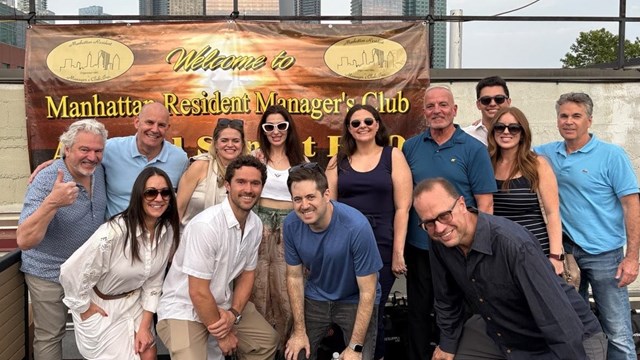
For more than one hundred years, The Real Estate Board of New York (REBNY) has been an invaluable resource for real estate professionals in New York City. More than just a trade association, REBNY has expanded over the years to include advocacy, community outreach, and educational efforts.
Inside REBNY
REBNY was originally formed as an alliance of commercial brokers. The group’s structure changed very little until the 1970s, when residential brokers, owners and builders became an integral part of the organization. Today, the group maintains a broad scope of operations, an expanded mission, and a membership that includes both residential and commercial property owners and developers, builders, brokers, law firms, banking institutions, architects and designers, service contractors, managing companies, and utilities providers. Experts from all of these fields inform and advise REBNY on developments affecting the real estate market in the city, and many chair REBNY-sponsored advisory committees on issues like tax law, zoning concerns, land use, and developments in rental policy.
Despite REBNY’s far-reaching agenda, the organization’s basic mission is straightforward. According to the REBNY Web site (at www.rebny.com), the group’s overarching goals are: to expand New York’s economy, to encourage the development and renovation of commercial and residential property, to enhance the city’s appeal as a business location and a place to live, and to facilitate property management.
A Chat With Steven Spinola
The Cooperator recently sat down with REBNY president Steven Spinola to ask him more about the group’s achievements and projects in the coming year.
What do you consider to be REBNY’s greatest accomplishments?
"A number of things stand out, aside from our involvement after September 11, which I’m not going to discuss, since it’s too early to look back at the work we’ve done. One thing that stands out is, maybe 11 years ago, Mayor Dinkins recommended a one-billion-dollar real estate tax increase. For the first time in our history we said no, and ran a campaign to oppose this. We got the tax increase down to $400 million—with the stipulation that $350 million would go to the police force. Real estate taxes have been frozen ever since then. This was a major accomplishment in two ways: we got rid of a ridiculous tax increase, and we got funds for the police force."
"Another accomplishment was, right before Giuliani was about to take office, lower Manhattan was in trouble, with a vacancy rate of over 25 percent. We organized a task force and wrote up a plan, we submitted the plan to Giuliani, and he accepted it. Prior to September 11, the vacancy rate in Lower Manhattan was under five percent. We were the major player—along with the Downtown Alliance—in revitalizing the neighborhood."
"Also, in the early ’90s, there was no low-income housing in Manhattan below 96th Street. So we organized a tax incentive program that encouraged building owners to dedicate 20 percent of the units in their buildings to lower-income residents. This has been one of the most successful integrated housing programs—some of the most wonderful buildings in New York have many low-income residents. And once a building owner said something that shows just how successful this program has been—he told me that when you walk into the building you can’t tell who the low-income residents are. We demonstrated that you can successfully have integrated housing."
What are REBNY’s goals for 2002?
"A major goal is to continue our work in Lower Manhattan—to assist the city and state in providing incentives for residents and businesses to stay in Lower Manhattan. We want to make sure that the rebuilding effort consists of more than just putting up buildings here and there, because the infrastructure also needs to be rebuilt. This is a long-term goal. We also are going to look at the city’s fiscal problems and help come up with the solutions."
What current issues, or controversies, is REBNY currently involved in?
"We’re following issues of rent regulation, as well as a proposition to revise the lead paint laws. We’re concerned about this issue, and we’ve carefully considered it and believe that the current laws are sufficiently strict."
Diversified Offerings
In addition to six specialized internal divisions (see sidebar), REBNY also maintains the Seymour B. Durst Library, an invaluable resource custom-designed for the real estate community. The library contains more than 500 volumes and 100 professional periodicals on industry topics, a database of mortgage and ownership information on all Manhattan properties, as well as valuation listings and property maps. Use of the library and database are free for REBNY members, and for a small fee, library staff can compile custom-ordered reports on a host of subjects.
REBNY also maintains a research department along with the Durst Library. REBNY researchers investigate and report on timely, industry-related issues, and also handle several board-sponsored publications; the Cooperative Sales Report, a quarterly-and-annual survey of recent co-op transactions; the Manhattan Market Profile, published bi-monthly in the fall, winter, and spring, that offers an exhaustive report of all property sectors in the market; the REBNY Update, a five-times-a-year organizational newsletter; the bi-annual Just for Brokers; and the REBNY Annual Journal, which is distributed at REBNY’s annual banquet and offers a look back at the group’s efforts over the past year and the real estate market as a whole.
And if that’s not quite enough, REBNY can also provide members with downloadable commercial and residential lease documents and advice with licensing issues, troublesome city bureaucracy and permits. The group publishes the Annual Diary & Manual—widely regarded as the industry’s unofficial almanac—which lists all REBNY members (new and old), new laws, and new city information. To disseminate information on all it has to offer, REBNY also hosts regular breakfasts, luncheons, and dinner meetings where members can socialize, network, and find out about the group’s latest projects and initiatives.
Turning Initiative Into Action
One of REBNY’s most recent efforts is going on even now, in Lower Manhattan. According to Spinola, "Since September 11, REBNY’s attention has been directed to Lower Manhattan. We’re working to restore the wonderful business and residential neighborhood that it once was, and that we believe it will be again."
Immediately after the destruction of the World Trade Center, REBNY worked to find office space for companies that were displaced by the attack. The organization also ran a shuttle bus to and from Battery Park City, until the city government took over the operation.
Over the last months, representatives from REBNY have worked closely with government officials including Governor Pataki and Senators Clinton and Schumer, as well as former Mayor Giuliani and new Mayor Michael Bloomberg, to make decisions about how the area will be rebuilt, and how funds will be dispersed among the thousands of people whose homes and businesses were affected by the attack.
REBNY is also both directly and indirectly involved in many charities throughout the city, such as the Teachers for Tomorrow program. Its response to the attack on the World Trade Center reflected a generosity that is typical of the organization—REBNY donated $14 million to charities dedicated to rebuilding the neighborhoods and the lives that were shattered by the events of September 11th.
At present, REBNY is lobbying for a government program to offer incentives for people to live and work in Lower Manhattan. Ultimately, one of REBNY’s most pivotal duties is to "sell the city," and convince people that New York is a unique and stimulating place to live and to conduct business. Now, with New York City under worldwide scrutiny as it deals with the aftermath of the 11th, it is more important than ever for the city to maintain its reputation as an international business center and great place to live. REBNY has stepped up to the plate, working to create programs that will prove to the world that New York is a city well on its way to recovery.
Now and Forever
In addition to its involvement downtown, REBNY is also working with the city to create more housing—which is in chronically short supply—and has had some recent successes in its lobbying efforts. The group lobbied against a bill that would have required all builders and developers to pay their contractors within three weeks of job completion. Though the bill was vetoed by Governor Pataki in its final stage, a recently passed disclosure bill was also closely monitored by REBNY. The new law requires building sellers to carefully document all aspects of a building and hand this information over to potential buyers. REBNY’s efforts succeeded in making co-op and condo sellers exempt from this law.
REBNY has also consistently taken a strong stance against the mandatory licensing of managing agents. Since managing agents have to be licensed to collect rent, REBNY argues, why should they be forced to get yet another license? Spinola, who is also the chairman of the Real Estate Education Committee for the State of New York, says that REBNY is open to the idea that it might be good to provide supplementary training to managing agents, but it does not see the benefit of making them go through a second licensing process.
Recently, REBNY attempted to organize a "multiple listing service" of shared real estate properties for New York City. Although the MLS never got off the ground—and further efforts to pursue it have been postponed—REBNY is continuing its efforts to foster cooperation within the residential real estate industry. "For ten years we’ve been stressing strong relations in the residential real estate community," says Spinola, "and we’re still talking about what’s best for the industry and the community at large. We encourage the sharing of listings and have imposed standards for cooperation."
Between offering resources and advice to New York City homeowners and shareholders, REBNY has been the indispensable voice of the real estate industry in the area for years. If the organization’s future plans and goals are any indication, REBNY will stand as a vital information and services conduit for many years to come.
Jennifer Baker is a freelance writer living in Brooklyn, New York.





Leave a Comment